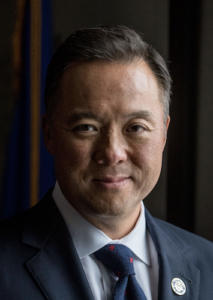 As Congress and the Supreme Court relegate an increasing number of responsibilities and authorities to the states—the core tenet of federalism—it raises questions about states’ capacity to meet these expectations and whether state constitutions provide sufficient guidance within states for direction of state governments’ permitted roles and obligations toward citizens’ rights. Our state attorney general will share his perspective on how states’ can work together on tasks once considered federal and on how human rights in Connecticut can be protected.
As Congress and the Supreme Court relegate an increasing number of responsibilities and authorities to the states—the core tenet of federalism—it raises questions about states’ capacity to meet these expectations and whether state constitutions provide sufficient guidance within states for direction of state governments’ permitted roles and obligations toward citizens’ rights. Our state attorney general will share his perspective on how states’ can work together on tasks once considered federal and on how human rights in Connecticut can be protected.
William Tong is the 25th Attorney General to serve Connecticut since the office was established in 1897. He took office on January 9, 2019 as the first Asian American elected at the statewide level, in Connecticut.
Before his election as Attorney General, Tong served for 12 years in Connecticut’s General Assembly representing the 147th District, which includes North Stamford and Darien. Most recently, Tong served as House Chairman of the Judiciary Committee. In this position Tong was responsible for all legislation related to constitutional law, criminal law, civil rights, consumer protection, probate, judicial nominations and the Judicial branch, and major areas of substantive law.
During his service in the legislature, Tong helped lead passage of landmark legislation, including the Connecticut Second Chance Act, Domestic Violence Restraining Order Act, Lost and Stolen Firearms Act, the Act Protecting Homeowner Rights, and the Act Protecting Schoolchildren.
A Connecticut native, Tong grew up in the Hartford area and attended schools in West Hartford. He graduated from Phillips Academy Andover, Brown University and the University of Chicago Law School. Before his election as Attorney General, he practiced law for 18 years as a litigator in both state and federal courts, first at Simpson Thacher & Bartlett LLP, in New York City and then for 15 years at Finn Dixon & Herling LLP, in Stamford.
Tong is the oldest of five children, and grew up working side-by-side with his immigrant parents in their family’s Chinese restaurant. He and his wife, Elizabeth, live in Stamford with their three children and too many pets. Elizabeth is Vice President of Tax for North America for Diageo Corporation.
Summary
Connecticut Attorney General William Tong presented an overview of his role, key responsibilities, and major initiatives. He emphasized the state’s sovereignty within the U.S. federal system and his office’s dual mandate: managing Connecticut’s legal affairs and addressing broader social issues such as consumer protection, public health, and corporate accountability.
Key responsibilities:
- Legal Management: Tong described his role as running Connecticut’s largest law firm, handling litigation, contracts, and regulatory issues for state agencies.
- Consumer Protection: He highlighted efforts to combat scams, ensure fair business practices, and address pressing social concerns like the opioid crisis, social media addiction, and vaping.
Major initiatives:
- Opioid Crisis: Tong led Connecticut’s role in securing over $50 billion in state settlements from opioid manufacturers and distributors, emphasizing the addiction industry’s devastating effects on families and communities.
- Tobacco Litigation: He discussed the legacy of the landmark tobacco settlement, which continues to fund public health initiatives while underscoring the inherent conflicts in relying on revenues from harmful industries.
- Social Media Accountability: Tong focused on lawsuits against platforms like Meta (Facebook and Instagram) for exploiting user addiction, particularly targeting youth. He explained the harmful impact of algorithms, content moderation failures, and the platforms’ role in promoting mental health issues and misinformation.
Broader themes:
- Federalism: Tong underscored the importance of historic state sovereignty in addressing issues Congress has failed to resolve.
- Corporate Accountability: He critiques industries like healthcare, pharmaceuticals, and technology for prioritizing profits over public well-being, advocating for systemic reforms.
- Youth and Technology: He expressed concern over social media’s addictive nature and its role in shaping harmful behaviors among young people, urging stronger state and corporate responsibility.
- Health and Gambling: Tong identified issues with legalized sports betting and vaping, particularly their appeal to young men, as ongoing challenges.
Challenges
- Systemic Inertia: Tong acknowledges that litigation is a slow and inefficient way to create policy, but he views it as necessary in the absence of congressional action.
- Balancing Innovation and Regulation: While advocating for stricter controls, he recognizes concerns about stifling technological and economic growth.
Closing thoughts:
Tong emphasized the role of attorneys general as a bipartisan force addressing large-scale issues Congress cannot, stressing the importance of state action in safeguarding public welfare. He calls for systemic changes to address healthcare costs, corporate influence, and the impact of digital technologies on society.
